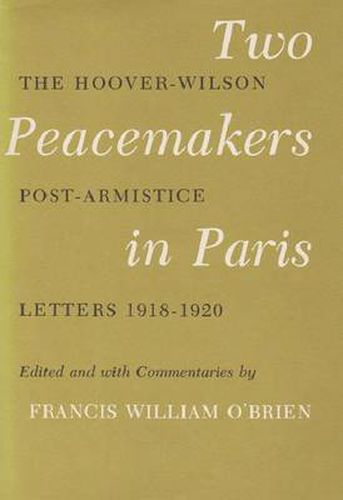Readings Newsletter
Become a Readings Member to make your shopping experience even easier.
Sign in or sign up for free!
You’re not far away from qualifying for FREE standard shipping within Australia
You’ve qualified for FREE standard shipping within Australia
The cart is loading…






This title is printed to order. This book may have been self-published. If so, we cannot guarantee the quality of the content. In the main most books will have gone through the editing process however some may not. We therefore suggest that you be aware of this before ordering this book. If in doubt check either the author or publisher’s details as we are unable to accept any returns unless they are faulty. Please contact us if you have any questions.
This volume contains all the letters that passed between President Woodrow Wilson and his close confidant and adviser Herbert Hoover while the two were participating in the Paris Peace Conference after the First World War. Wilson headed the American delegation at that conference, and Hoover was Director General for Relief and Reconstruction of Europe. Their correspondence deals with some of the most important events of modern times; it also shows how policies are formed, how things are done in crises, and how men manipulate events and each other to attain great ends. The letters reveal Hoover’s anxiety over the efforts of Communists to seize prostrate Austria, Germany, and Hungary, and they provide details of the abortive attempt by Hoover and Wilson to stop the civil war in Russia and to provide food for that starving nation. Wilson disagreed with Hoover’s sharp criticism of the Versailles Treaty. Earlier they had been as one in their objection to the British and French food blockade and to Clemenceau’s censorship of the Paris press, his intrigues to block the Russian food mission, and his attempts to dismember Germany. The book presents fresh insights into Hoover’s views of the League of Nations and international cooperation in general. Professor O'Brien’s introduction details the organization and procedure of the peace conference and underscores the herculean tasks of Wilson and Hoover as they confronted the complex problems of peacemaking. Short commentaries before individual letters clarify the particular problems under discussion.
$9.00 standard shipping within Australia
FREE standard shipping within Australia for orders over $100.00
Express & International shipping calculated at checkout
Stock availability can be subject to change without notice. We recommend calling the shop or contacting our online team to check availability of low stock items. Please see our Shopping Online page for more details.
This title is printed to order. This book may have been self-published. If so, we cannot guarantee the quality of the content. In the main most books will have gone through the editing process however some may not. We therefore suggest that you be aware of this before ordering this book. If in doubt check either the author or publisher’s details as we are unable to accept any returns unless they are faulty. Please contact us if you have any questions.
This volume contains all the letters that passed between President Woodrow Wilson and his close confidant and adviser Herbert Hoover while the two were participating in the Paris Peace Conference after the First World War. Wilson headed the American delegation at that conference, and Hoover was Director General for Relief and Reconstruction of Europe. Their correspondence deals with some of the most important events of modern times; it also shows how policies are formed, how things are done in crises, and how men manipulate events and each other to attain great ends. The letters reveal Hoover’s anxiety over the efforts of Communists to seize prostrate Austria, Germany, and Hungary, and they provide details of the abortive attempt by Hoover and Wilson to stop the civil war in Russia and to provide food for that starving nation. Wilson disagreed with Hoover’s sharp criticism of the Versailles Treaty. Earlier they had been as one in their objection to the British and French food blockade and to Clemenceau’s censorship of the Paris press, his intrigues to block the Russian food mission, and his attempts to dismember Germany. The book presents fresh insights into Hoover’s views of the League of Nations and international cooperation in general. Professor O'Brien’s introduction details the organization and procedure of the peace conference and underscores the herculean tasks of Wilson and Hoover as they confronted the complex problems of peacemaking. Short commentaries before individual letters clarify the particular problems under discussion.